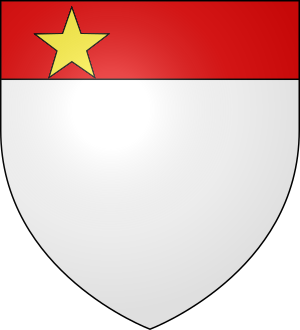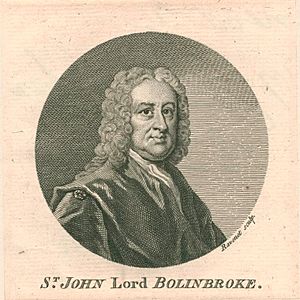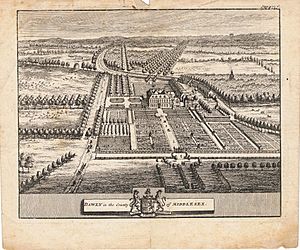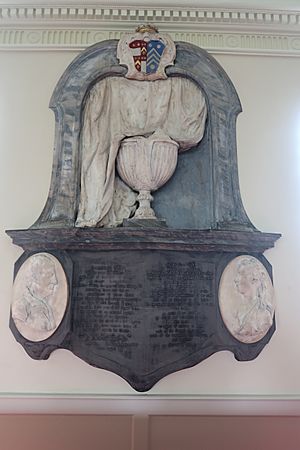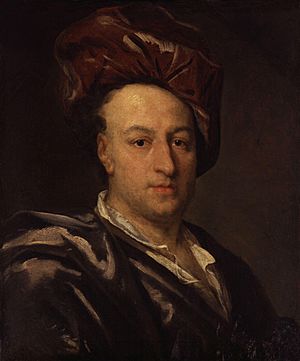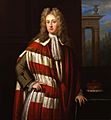Henry St John, 1st Viscount Bolingbroke facts for kids
Quick facts for kids
The Viscount Bolingbroke
|
|
|---|---|
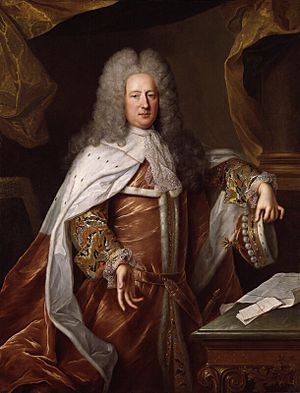
Henry St John, 1st Viscount Bolingbroke. Attributed to Alexis Simon Belle, c. 1712. (NPG 593 at the National Portrait Gallery, London).
|
|
| Secretary of State for the Southern Department | |
| In office 17 August 1713 – 31 August 1714 |
|
| Monarch | |
| Preceded by | The Earl of Dartmouth |
| Succeeded by | James Stanhope |
| Secretary of State for the Northern Department | |
| In office 21 September 1710 – 17 August 1713 |
|
| Monarch | Anne |
| Preceded by | Henry Boyle |
| Succeeded by | William Bromley |
| Secretary at War | |
| In office 1704–1708 |
|
| Monarch | Anne |
| Preceded by | George Clarke |
| Succeeded by | Robert Walpole |
| Jacobite Secretary of State | |
| In office July 1715 – March 1716 |
|
| Monarch | James Francis Edward Stuart |
| Preceded by | Thomas Higgons |
| Succeeded by | John Erskine, Earl of Mar |
| Personal details | |
| Born |
Henry St John
16 September 1678 Battersea, Surrey England |
| Died | 12 December 1751 (aged 73) Battersea, London, Great Britain |
| Political party | Tory |
| Spouses |
|
| Parents |
|
| Alma mater | Christ Church, Oxford |
| Signature | |
Henry St John, 1st Viscount Bolingbroke (born September 16, 1678 – died December 12, 1751) was an important English politician and thinker. He was a main leader of the Tory party. He also supported the Church of England, even though he had his own ideas about religion.
Bolingbroke was involved in a rebellion in 1715. This rebellion tried to remove the new king, George I, from power. After the rebellion failed, Bolingbroke had to escape to France. There, he worked for the Pretender, who wanted to be king. He was accused of treason, which is a serious crime against your country. However, he later changed his mind and was allowed to come back to England in 1723.
Bolingbroke is remembered for his political ideas. He wrote for a newspaper called The Craftsman. In his writings, he shared his views on how the government should work.
Contents
Early Life and Family
Henry St John was likely born at Lydiard Tregoze in Wiltshire, England. He was the son of Sir Henry St John and Lady Mary Rich.
He traveled to France, Switzerland, and Italy in 1698 and 1699. During this time, he became very good at speaking French. He also made friends with other important people. In 1700, he married Frances Winchcombe.
Beginning His Political Career
In 1701, Henry St John became a Member of Parliament (MP). He represented Wootton Bassett in Wiltshire. As a Tory, he joined forces with Robert Harley, who was then the Speaker of the House of Commons. Bolingbroke was known for being a great speaker. He was even better than his school friend, Robert Walpole.
In 1704, St John became the Secretary at War. This job meant he worked closely with John Churchill, 1st Duke of Marlborough, a famous military leader. In 1708, he left his job when Harley's plans failed. He returned to politics in 1710. He became a privy counsellor and a Secretary of State in Harley's new government.
Peace Talks and Political Rivalry
By 1706, many people felt that the war with France had gone on too long. Queen Anne and Parliament wanted to end the fighting. Bolingbroke started secret talks with France to protect England's interests. In 1712, he told the Duke of Ormonde, who was leading the army, to stop fighting. This was kept secret from England's allies.
Later, Bolingbroke went to France and signed a temporary peace agreement. Finally, the Treaty of Utrecht was signed in March 1713. This treaty officially ended the war.
During this time, the friendship between Bolingbroke and Harley began to fall apart. In 1711, Harley became the Earl of Oxford and the Lord Treasurer. Bolingbroke was disappointed because he only received a lower title, Viscount. He had hoped for an earldom.
The Queen's health was getting worse, and Tory ministers worried about what would happen when a new king took over. Bolingbroke was seen talking with the Pretender, which was risky. Both Bolingbroke and Oxford told the Pretender that he needed to change his religion to have a chance at becoming king. But the Pretender refused.
Bolingbroke slowly became more powerful than Oxford. He supported a law called the Schism Bill in 1714. This law made it harder for non-Anglicans to run schools. Oxford was dismissed from his job on July 27, 1714. Queen Anne died just four days later.
Life in Exile
When George I became king, Bolingbroke was immediately removed from his job. The new king was close to the Whigs, not the Tories. Bolingbroke tried to defend the previous government in Parliament, but it was no use.
Bolingbroke then made a big mistake: he fled to Paris in disguise. He made an even bigger mistake by joining the Pretender's court. He was made the Earl of Bolingbroke in the Jacobite Peerage and handled their foreign affairs. However, the rebellion of 1715 failed badly. The French king, Louis XIV, died, and the new French king wanted peace with Britain.
In March 1716, Bolingbroke changed sides again. He had lost his titles and property because Parliament declared him a traitor. He hoped to get back into King George's good graces, and he did so a few years later.
While in exile, he wrote about his experiences. In 1720, he married Marie Claire Deschamps de Marcilly after his first wife passed away. He lived in France, studied philosophy, and was visited by famous thinkers like Voltaire.
Pardon and Return to England
In 1723, Bolingbroke received a pardon and was allowed to return to London. Robert Walpole, a powerful politician, did not want him to return, but the king insisted. In 1725, Parliament allowed Bolingbroke to own land again, but he was still not allowed to be a member of the House of Lords.
He bought an estate called Dawley near Uxbridge. There, he spent time with his friends, the famous writers Pope and Swift. He also wrote some of the ideas for Pope's famous poem, An Essay on Man.
Bolingbroke tried to create a political group to oppose Walpole. He wrote articles for The Craftsman newspaper, attacking Walpole's policies. He even tried to get the king's mistress to help him. It seemed like he might become a chief minister, but then King George I died in June 1727. This ruined Bolingbroke's plans.
He continued to write articles and essays, criticizing the government. He tried to unite the Tories and the Whigs who opposed Walpole. However, after new elections in 1735, Walpole remained in power with a large majority.
Bolingbroke, feeling defeated, returned to France in June 1735. He wrote more books there, including Letters on the Study of History. He visited England again in 1738 and became an adviser to Frederick, Prince of Wales, who was leading the opposition. He wrote The Patriot King for this occasion. But he failed to get back into politics and returned to France in 1739. He eventually sold his estate at Dawley.
In 1744, he settled permanently at Battersea with his friend Hugh Hume. He was there when Pope died. He also got into an argument with another writer, Warburton.
Later Life and Death
In 1744, Bolingbroke helped with talks to form a new government. He did not support the Jacobite rebellion in 1745. He also recommended a tutor for Prince George, who later became King George III.
Henry St John died on December 12, 1751, at the age of 73. His second wife had died one year before him. They were both buried in St Mary's Church in Battersea. A monument with their pictures and words written by Bolingbroke himself was put up to remember them.
His half-nephew, Frederick St John, inherited his title.
His Impact and Ideas
Bolingbroke's ideas had a big influence on many people.
- He influenced famous French thinkers like Voltaire.
- His writings were very popular in the American colonies. Leaders like John Adams, Thomas Jefferson, and James Madison read his works. They helped shape the idea of republicanism in America. Bolingbroke believed that people are "free not from the law, but by the law."
- In Britain, his ideas influenced George III and Bute.
- Benjamin Disraeli, a later Prime Minister, called Bolingbroke the "Founder of Modern Toryism." He believed Bolingbroke helped shape the Tory party's goals.
Even though he was very important in his time, later generations sometimes saw him differently. Some thought he was brilliant but also selfish and tricky. His writings were described as clever but not always deeply philosophical.
The Country Party Idea
Bolingbroke was especially important for explaining the need for a strong parliamentary opposition. He called this an "country party" and contrasted it with the "court party" (the government in power).
He believed that freedom was in danger if the government had too much power. He thought an opposition party was needed to use "constitutional methods" to challenge the government. This party should try to "Wrest the power of government" from those who used it poorly. He believed this work could only be done by a united party that was always ready to challenge the government. He thought a party that always opposed the government was better than one that only did so sometimes. This opposition party needed to be ready to take control of the government.
Works
- Lashmore-Davies, Adrian C., ed. "The Correspondence of Henry St. John and Sir William Trumbull, 1698–1710", Eighteenth-Century Life 32, no. 3 (2008), pp. 23–179.
- Parke, G., ed. The Letters and Correspondence of Henry St John, Lord Viscount Bolingbroke. 4 vols. 1798.
- Dickinson, H. T., ed. "The Letters of Henry St. John to the Earl of Orrery, 1709–1711" Camden Miscellany, vol. XXVI. Camden Fourth Series. Volume 14 (London: The Royal Historical Society, 1975), pp. 137–199.
- H. T. Dickinson (ed.). "Letters of Bolingbroke to the Earl of Orrery, 1712–13", Camden Miscellany, Vol. XXXI. Camden Fourth Series. Volume 44 (London: The Royal Historical Society, 1992), pp. 349–371.
- The works of the late Right Honourable Henry St. John, Lord Viscount Bolingbroke, new ed., Vol. 1 (London, 1809).
- The works of the late Right Honourable Henry St. John, Lord Viscount Bolingbroke, new ed., Vol. 2 (London, 1809).
- The works of the late Right Honourable Henry St. John, Lord Viscount Bolingbroke, new ed., Vol. 3 (London, 1809).
- The works of the late Right Honourable Henry St. John, Lord Viscount Bolingbroke, new ed., Vol. 4 (London, 1809).
- The works of the late Right Honourable Henry St. John, Lord Viscount Bolingbroke, new ed., Vol. 5 (London, 1809).
- The works of the late Right Honourable Henry St. John, Lord Viscount Bolingbroke, new ed., Vol. 6 (London, 1809).
- The works of the late Right Honourable Henry St. John, Lord Viscount Bolingbroke, new ed., Vol. 7 (London, 1809).
- The works of the late Right Honourable Henry St. John, Lord Viscount Bolingbroke, new ed., Vol. 8 (London, 1809).
- The Works of Lord Bolingbroke, Vol 1. University Press of the Pacific, 2001. ISBN: 0-89875-352-X
- Armitage, David, ed. Bolingbroke: Political Writings (Cambridge Texts in the History of Political Thought). Cambridge University Press, 1997. ISBN: 0-521-58697-6
- The Philosophical Works of the Late Right Honourable Henry St John, Lord Viscount Bolingbroke, 3 vol. 1776, reprint 2005. ISBN: 1-4212-0061-9
- Jackman, S. W., ed. The Idea of a Patriot King. Indianapolis, 1965.
- The Works of the Late Right Honorable Henry St. John, Lord Viscount Bolingbroke was first published in March 1754 in five quarto volumes. A decade later, the highly successful London bookseller Andrew Millar was still selling the Works for a considerable fortune, setting the price at three guineas (three pounds and three shillings), a clear indication of the importance and value of the text. In a letter to Dr. Cadell in July 1765, Millar wrote "I never sold a Bolingbroke in quarto under 3 guineas ... Wren paid so and I can't now alter the price".
Images for kids
-
Henry St John, 1st Viscount Bolingbroke. Attributed to Charles Jervas.
See also
 In Spanish: Henry St John, vizconde de Bolingbroke para niños
In Spanish: Henry St John, vizconde de Bolingbroke para niños
 | Madam C. J. Walker |
 | Janet Emerson Bashen |
 | Annie Turnbo Malone |
 | Maggie L. Walker |


